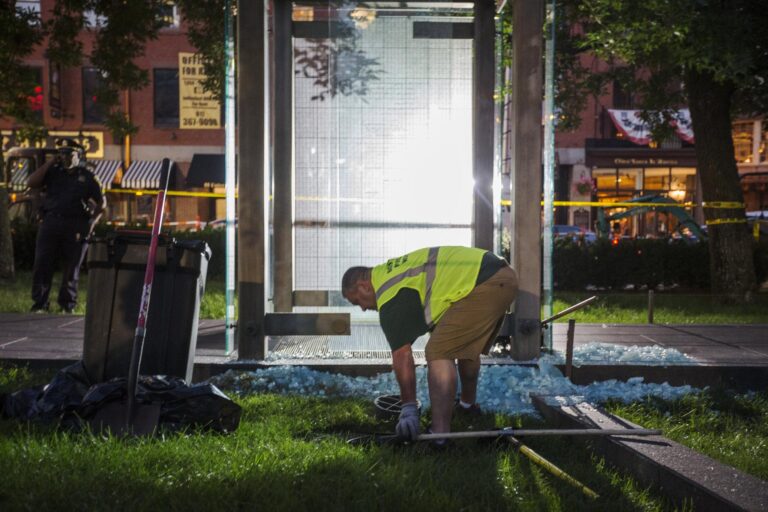In a shocking incident that has sparked outrage across communities, a Holocaust memorial in Lyon, France, was defaced with the phrase “Free Gaza” earlier this week. The act of vandalism has drawn widespread condemnation from various groups, highlighting the sensitive intersection of history, memory, and contemporary political conflicts. As tensions escalate in the Middle East, this incident serves as a stark reminder of the challenges in addressing global issues while respecting the memories and experiences of past atrocities. The community grapples with the implications of such acts, reflecting broader societal rifts and the importance of preserving historical integrity amid ongoing debates about justice and human rights.
Vandalism of Holocaust Memorial Sparks Outrage in Lyon
The recent act of vandalism targeting a Holocaust memorial in Lyon has ignited widespread condemnation across various communities. The phrase ŌĆ£Free GazaŌĆØ was scrawled across the memorial, prompting outrage among both local citizens and international observers. Many have expressed that such an act is not just a blatant disrespect for history, but also an affront to the memory of those who suffered during the Holocaust. Local authorities and Jewish organizations are calling for stringent actions against the perpetrators, emphasizing the importance of preserving the sanctity of memorial sites dedicated to tragic pasts.
As reactions pour in, several public figures have spoken out against the incident, emphasizing the need for unity in remembering historical atrocities. Community leaders urge that this act should not only be viewed in the context of anti-Semitism but should also serve as a reminder of the larger implications of hate and division. The debate surrounding this incident highlights the tensions in current geopolitical discussions, reminding all of the responsibility to honor the past while fostering dialogue rather than polarization. Key reactions include:
- Local residents: Expressed shock and anger at the desecration.
- Jewish organizations: Called for restorative actions and increased security for memorials.
- Political figures: Stress the importance of confronting hate speech in all forms.
Debate Over Freedom of Expression and Antisemitism Intensifies
Recent events in Lyon, where the phrase “Free Gaza” was vandalized onto a Holocaust memorial, have sparked a fierce debate surrounding the balance between freedom of expression and the rise of antisemitism in contemporary discourse. Advocates argue that freedom of speech remains a cornerstone of democratic societies; however, critics contend that such expressions can dangerously normalize hatred and intolerance. The incident has not only outraged the Jewish community but also garnered attention from various civil rights organizations, stirring a complex conversation about how societies reconcile their commitment to free speech with the implications of hate speech.
In the aftermath of the vandalism, several key points have emerged in discussions among community leaders and policymakers:
- Historical Sensitivity: The Holocaust serves as a poignant reminder of the consequences of unchecked hatred.
- Public Responsibility: Is there an ethical obligation to monitor and limit expressions that may promote violence or discrimination?
- Legal Frameworks: How do existing laws around hate speech and freedom of expression apply in such situations?
| Aspect | Arguments For | Arguments Against |
|---|---|---|
| Freedom of Expression | Essential for democracy | Can lead to hate speech |
| Social Cohesion | Encourages open dialogue | Risk of division |
| Historical Context | Required to prevent censorship | Must honor past atrocities |
Community Leaders Call for Unity Against Hate Crimes
In a shocking incident that has drawn widespread condemnation, the phrase “Free Gaza” was spray-painted onto the Holocaust Memorial in Lyon, France. This act of vandalism has not only disrespected the memory of the millions who perished in the Holocaust but has also sparked outrage among various community leaders and organizations. In response to this intolerable act, community leaders are urging citizens to unite against hate crimes, emphasizing that such acts threaten the fabric of our society. As the city grapples with this latest incident, calls for solidarity and understanding across diverse communities echo throughout Lyon.
Local officials and advocacy groups are now mobilizing to foster a more inclusive dialogue, aiming to combat hate and intolerance in all forms. Key points from recent discussions include:
- Education Initiatives: Promoting awareness of historical events to combat ignorance.
- Community Workshops: Engaging the public in conversations about diversity and acceptance.
- Support Networks: Creating safe spaces for affected community members to share their experiences.
With a firm commitment to stand against such divisive actions, leaders hope to turn this unfortunate incident into an opportunity for growth and unity. By strengthening community bonds and promoting respect for all, there is hope for a future where such hateful expressions become a relic of the past.
Historical Context of Jewish Persecution in France and Its Relevance Today
The historical context of Jewish persecution in France dates back centuries, with significant events marking the painful trajectory of the Jewish community. From the late Middle Ages, Jews faced expulsions, discrimination, and forced conversions. The Dreyfus Affair in the late 19th century starkly revealed deep-seated antisemitism in French society, leading to widespread public outcry and debates about nationalism and civil rights. Between the two World Wars, the rise of fascism and Vichy France’s collaboration with Nazi Germany brought about devastating consequences, including the deportation of thousands to concentration camps. This legacy of persecution shaped not only Jewish resistance but also broader narratives of humanitarian rights in France.
In contemporary times, the echoes of this turbulent history resonate as France grapples with its modern identity regarding multiculturalism and tolerance. Recent acts of antisemitism, such as the vandalism of Holocaust memorials, underscore a troubling resurgence of hate amidst ongoing geopolitical tensions, particularly surrounding Israel and Palestine. Factors contributing to this rising tide of intolerance include:
- Political Rhetoric: Heightened tensions in Middle Eastern politics often spill over into domestic sentiments.
- Social Media: The rapid spread of misinformation and hate speech fuels division.
- Historical Amnesia: A lack of awareness and education about the past can lead to repeated cycles of hatred.
French society is now faced with the urgent challenge of confronting these issues against the backdrop of its own history, invoking the need for a collective memory that honors the past while fostering a more inclusive future.
In Summary
In conclusion, the vandalism of the Holocaust memorial in Lyon, France, with the phrase ŌĆ£Free GazaŌĆØ has ignited widespread outrage and condemnation. This incident underscores the sensitivity surrounding the ongoing conflict in the Middle East and highlights the importance of commemorating historical atrocities with the respect and solemnity they deserve. As communities grapple with the resurgence of antisemitism and divisive rhetoric, it is crucial to foster dialogue that honors the lessons of the past while addressing contemporary issues. Authorities have vowed to investigate this act, emphasizing the need for vigilance against hate and intolerance. As the situation evolves, the conversation around historical memory and its significance in todayŌĆÖs world remains more relevant than ever.




